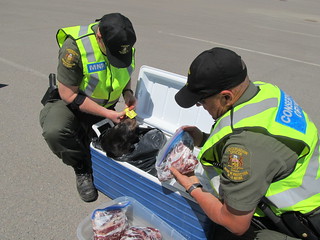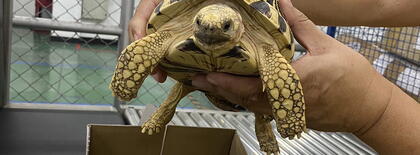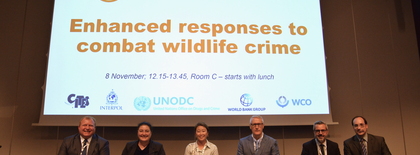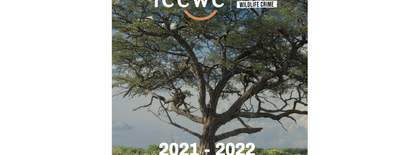For use of the media only;
not an official document.
PRESS RELEASE
Month-long transcontinental operation hit wildlife criminals hard
The largest ever global operation results in 1,974 seizures and the identification of 1,400 suspects
1.3 tonnes of elephant ivory, 8 tonnes of pangolins scales, 4,000 birds and 27,000 reptiles among the specimens seized
Geneva, 19 June 2018– An international operation against the illegal trade in wild animals and plants including timber has seen hundreds ofseizures worldwide as well as arrests of suspects.
Code-named “Thunderstorm” and targeting the people and networks behind global wildlife crime, the operation involved police, customs, border, wildlife, forestry and environment agencies from 92 countries and resulted in millions of dollars-worth of seizures.
The month-long operation, from 1 to 31 May, has so far brought 1,974 seizures and the identification of some 1,400 suspects, triggering arrests and investigations worldwide. Further arrests and prosecutions are foreseen as ongoing investigations unfold.
According to INTERPOL, total worldwide seizures reported to date include:
- 43 tonnes of wild meat (from bear, elephant, crocodile, whale and zebra etc.)
- 1.3 tonnes of raw and processed elephant ivory
- 27,000 reptiles (including approximately 869 alligators/crocodiles, 9,590 turtles and 10,000 snakes)
- almost 4,000 birds, including pelicans, ostriches, parrots and owls
- several tonnes of wood and timber
- 48 live primates
- 14 big cats (tiger, lion, leopard and jaguar)
- the carcasses of 7 bears, including 2 polar bears
The operation saw 8 tonnes of pangolin scales seized worldwide, including almost 4 tonnes by Vietnamese maritime authorities on board a ship arriving from the Democratic Republic of the Congo.
Two flight attendants were arrested in Los Angeles attempting to smuggle live spotted turtles to Asia in their personal baggage. Both suspects have been charged with smuggling CITES-protected species and a transnational investigation has been opened between the countries concerned.
A man was arrested in Israel and awaits deportation to Thailand after his hunting photograph on social media led to the seizure of multiple wildlife items at his home including fox, jackal and mongoose bodies. Follow-up inquiries have revealed that the suspect was also engaged in people smuggling and illegal employment.

|
Canadian authorities intercepted a container holding 18 tonnes of eel meat arriving from Asia. Thought to be poached from Europe originally, the juvenile glass eels had been reared in Asia before being dispatched to North American markets for consumption.
An integrated global response
The second in a global ‘Thunder’ series initiated by the INTERPOL Wildlife Crime Working Group, Operation Thunderstorm was coordinated by INTERPOL and the World Customs Organization (WCO) in conjunction with the International Consortium on Combating Wildlife Crime (ICCWC), which includes the Convention on International Trade in Endangered Species of Wild Fauna and Flora (CITES) Secretariat, UNODC and the World Bank.
“Operation Thunderstorm has seen significant seizures at global level, showing how coordinated global operations can maximize impact,” said INTERPOL Secretary General Jürgen Stock.
“By revealing how wildlife trafficking groups use the same routes as criminals involved in other crime areas – often hand in hand with tax evasion, corruption, money laundering and violent crime – Operation Thunderstorm sends a clear message to wildlife criminals that the world’s law enforcement community is homing in on them,” added the Secretary General.
An intelligence-driven operation
Investigative crime intelligence was gathered ahead of the operation to help target specific hotspots for action, including land and airport border points and wildlife parks.
Cars, trucks, boats and cargo transporters suspected of moving illicit products were also targeted with searches carried out by officers, often with specialist sniffer dogs and x-ray scanners.
“By leveraging the global network of worldwide environmental law enforcement experts and customs community’s commitment to protecting wildlife, WCO and its partners have clearly illustrated the power and effectiveness of international cooperation in keeping our natural heritage safe, both now and for future generations,” said WCO Secretary General Kunio Mikuriya.
“Operation Thunderstorm clearly demonstrates that by pooling our transnational law enforcement collaboration in the field, WCO and INTERPOL firmly contribute to making sure that borders everywhere divide criminals but connect customs and law enforcement as a whole to make the world a safer place,” added Dr Mikuriya.
Results will continue to be analysed globally to generate intelligence which will be used as guidance in future national, regional and international law enforcement efforts.
Organized wildlife crime: everybody’s business
The organized crime groups behind wildlife crime target high-value animal and plant specimens, and operate through complex global criminal networks. Driven by profit, the activities of these groups can have devastating economic, social and environmental impacts.
Ben Janse van Rensburg, CITES Secretariat Chief of Enforcement Support said: “No one country, region or agency can tackle illegal wildlife trade alone. Collective action across source, transit and destination states is essential. On behalf of all ICCWC partner agencies, I commend the excellent work done in member countries - Operation Thunderstorm is testimony to what can be achieved if we all work together.”
Senior officer Grant Miller of the UK Border Force and head of the UK national CITES enforcement team, said: “Through Operation Thunderstorm, criminals have seen the products they need to ply their trade seized and their illegal profits targeted. Organized crime groups engaging in wildlife crime will feel the impact of this operation for a long time.”
Mr. Miller is also chair of the INTERPOL Wildlife Crime Working Group, which leads a number of projects to combat the poaching, trafficking, or possession of legally protected flora and fauna.
Note to editors:
For more information and to arrange interviews, please contact Liu Yuan at +41 22 917 8130 or yuan.liu [at] cites.org (yuan[dot]liu[at]cites[dot]org)
See also:
- Wildlife crime: global seizures and arrests in transcontinental operation (Interpol press release)
- Photos from Operation ThunderStorm on CITES Flickr page (courtesy of Interpol)
About CITES
With 183 Parties, Convention on International Trade in Endangered Species of Wild Fauna and Flora (CITES) remains one of the world's most powerful tools for wildlife conservation through the regulation of trade. Thousands of species are internationally traded and used by people in their daily lives for food, health care, housing, tourist souvenirs, cosmetics or fashion.
CITES regulates international trade in over 36,000 species of plants and animals, including their products and derivatives, to ensure their survival in the wild with benefits for the livelihoods of local people and the global environment. The CITES permit system seeks to ensure that international trade in listed species is sustainable, legal and traceable.
CITES was signed in Washington D.C. on 3 March 1973 and entered into force on 1 July 1975.Learn more about CITES by visiting www.cites.org or connecting to:
About ICCWC
ICCWC is a collaborative effort of the CITES Secretariat, INTERPOL, the United Nations Office on Drugs and Crime (UNODC), the World Bank and the World Customs Organization (WCO), to strengthen criminal justice systems and provide coordinated support at national, regional and international level to combat wildlife and forest crime.
ICCWC has since its establishment, delivered innovative tools and provided crucial services and technical support to the law enforcement community to strengthen responses to wildlife crime.
For more information on ICCWC please visit: /eng/prog/iccwc.php
For more information on the Consortium’s support to Parties, please see: /success-stories
For more information on tools and services available through ICCWC, please see: /tools-and-services
Documents on the International Consortium on Combating Wildlife Crime (ICCWC) can be found on:



